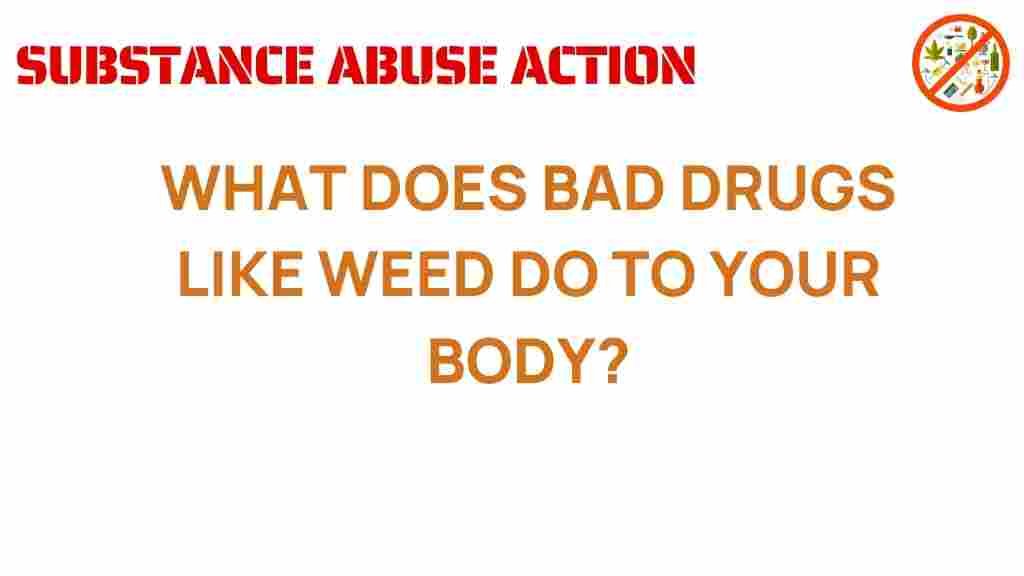Unveiling the Hidden Dangers: What Bad Drugs Like Weed Do to Your Body
The conversation around bad drugs often centers on the immediate effects and visible consequences of substance abuse. However, many overlook the subtle, long-term health risks associated with these substances. One substance that often comes up in discussions about bad drugs is cannabis, commonly known as weed. While it is frequently touted for its medicinal benefits, it is essential to address the potential negative effects on both mental and physical health. This article delves into the weed effects on the body, the risks of addiction, and the importance of rehabilitation and recovery.
Understanding Bad Drugs and Their Impact
When we discuss bad drugs, we encompass a range of substances that can lead to addiction and various health issues. While not all drugs have the same level of danger, even those perceived as less harmful, like cannabis, can pose significant risks. Understanding these dangers is crucial for making informed decisions about drug use.
The Effects of Weed on Mental Health
One of the most concerning aspects of cannabis use is its impact on mental health. Studies have shown that regular cannabis use can lead to:
- Anxiety and Depression: While some users report that cannabis alleviates anxiety, long-term use can actually exacerbate symptoms of anxiety and depression.
- Cognitive Decline: Chronic use of cannabis has been linked to impairments in memory, attention, and learning capabilities.
- Psychosis: High doses of THC, the psychoactive component in weed, can trigger episodes of psychosis, particularly in individuals predisposed to mental health disorders.
These weed effects can lead to a cycle of substance abuse, where individuals use cannabis as a form of self-medication, further worsening their mental health.
The Effects of Weed on Physical Health
The physical health risks associated with cannabis use are often underestimated. Here are some of the key concerns:
- Respiratory Issues: Smoking weed can damage lung tissues and lead to chronic bronchitis and other respiratory conditions.
- Cardiovascular Risks: Cannabis use can increase heart rate and may pose risks to individuals with pre-existing heart conditions.
- Dependency and Withdrawal: Regular use can lead to physical dependence, and withdrawal symptoms can include irritability, insomnia, and appetite changes.
These health risks highlight the importance of understanding the implications of using cannabis regularly.
Recognizing Addiction and Substance Abuse
Understanding the difference between casual use and addiction is crucial. Addiction is characterized by compulsive drug seeking and use, despite harmful consequences. The signs of cannabis addiction include:
- Inability to stop using despite wanting to.
- Increased tolerance, requiring more of the substance to achieve the same effects.
- Withdrawal symptoms when not using cannabis.
- Neglecting responsibilities and relationships due to drug use.
If you or someone you know is struggling with substance abuse, it’s essential to seek help. Many resources are available for those needing assistance in overcoming addiction.
Steps for Recovery and Rehabilitation
Recovering from addiction is a journey that requires commitment and support. Here’s a step-by-step approach to rehabilitation:
- Recognize the Problem: Acknowledging that cannabis use is affecting your life is the first step towards recovery.
- Seek Professional Help: Consulting with healthcare professionals can provide the necessary guidance and support.
- Participate in Therapy: Behavioral therapies, such as cognitive-behavioral therapy (CBT), can help address the underlying issues of addiction.
- Join Support Groups: Connecting with others who have similar experiences can provide emotional support and accountability.
- Develop Coping Strategies: Learning healthy coping mechanisms can help manage cravings and prevent relapse.
Successful recovery often involves addressing both the physical and psychological components of addiction.
Tips for Prevention and Support
Preventing substance abuse starts with education and awareness. Here are some tips:
- Educate Yourself: Understanding the risks associated with cannabis and other bad drugs can empower better decision-making.
- Communicate: Open conversations about drug use with friends and family can foster a supportive environment.
- Practice Healthy Habits: Engaging in physical activity, hobbies, and social events can reduce the likelihood of turning to drugs for relief.
If you notice signs of addiction in yourself or a loved one, it is crucial to take action promptly. Seeking guidance from health professionals or visiting resources like National Institute on Drug Abuse can provide necessary assistance.
Understanding the Long-Term Consequences
Long-term cannabis use can lead to a range of health consequences that may not be immediately apparent. Some of these include:
- Chronic Mental Health Issues: Long-term users may be at a greater risk of developing chronic mental health conditions.
- Social Isolation: Addiction can lead to strained relationships and a lack of social connections.
- Financial Difficulties: The cost of obtaining drugs can lead to financial strain and related issues.
Being aware of these potential long-term consequences can motivate individuals to seek help before the situation escalates.
Conclusion
While cannabis is often viewed through a lenient lens, it is essential to recognize it as a bad drug with significant health risks. Understanding the weed effects on both mental and physical health is crucial for making informed choices. The risks of substance abuse and addiction are real and can lead to devastating consequences.
However, recovery is possible. By acknowledging the problem, seeking professional help, and utilizing support systems, individuals can overcome addiction and rebuild their lives. Remember, the journey to recovery begins with a single step—make that step today.
For more information on recovery resources, check out Substance Abuse and Mental Health Services Administration.
This article is in the category Health and created by SubstanceAbuseAction Team
